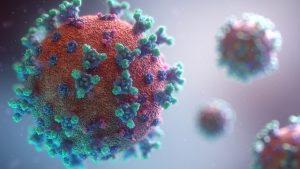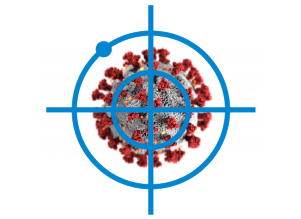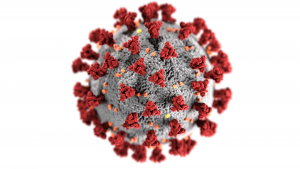 The Antibody Society’s series “Coronavirus in the crosshairs” examines the ongoing discovery and development of COVID-19 interventions for broad use, including small molecule and biologic drugs, and vaccines. Parts 1 and 2 examined re-purposed small molecule and biologic drugs and new vaccines, respectively, while Part 3 focused on COVID-19 convalescent plasma treatments in development. The specific content of the posts is prioritized based on when the interventions might be available to either patients or healthy people, including health care workers. Re-purposed small molecule and biologic drugs are likely to be available first, followed by new vaccines and drugs.
The Antibody Society’s series “Coronavirus in the crosshairs” examines the ongoing discovery and development of COVID-19 interventions for broad use, including small molecule and biologic drugs, and vaccines. Parts 1 and 2 examined re-purposed small molecule and biologic drugs and new vaccines, respectively, while Part 3 focused on COVID-19 convalescent plasma treatments in development. The specific content of the posts is prioritized based on when the interventions might be available to either patients or healthy people, including health care workers. Re-purposed small molecule and biologic drugs are likely to be available first, followed by new vaccines and drugs.
In Part 4 of the series, we provide additional details about re-purposed biologics, such as monoclonal antibodies (mAbs) that are marketed or in clinical studies for other indications, that might ameliorate COVID-19 symptoms and that are already in clinicals studies of COVID-19 patients. We also discuss anti-SARS-CoV-2 antibodies that are in preclinical development and may enter clinical study by the end of 2020.
As mentioned in Part 3, there is no current evidence from randomized controlled trials to recommend any specific anti-SARS-CoV-2 treatment for patients with suspected or confirmed SARS-CoV-2 infection. Therefore, clinical studies must be done to determine the safety and efficacy of the agents when administered to COVID-19 patients.
Re-purposed mAbs in clinical studies
To date, nearly 100 mAb therapeutics are approved and currently marketed in at least one country. A number of these products have mechanisms of action that are relevant to COVID-19, although they are not anti- SARS-CoV-2 agents. Zhou et al. have shown that SARS-CoV-2 infection leads to activation of CD4+ T lymphocytes, which become pathogenic T helper (Th) 1 cells and generate cytokines such as Granulocyte-macrophage colony-stimulating factor, GM-CSF. This environment induces CD14+CD16+ monocytes with high expression of IL-6, which accelerates inflammation. Moreover, Chen et al. reported that IL-6 levels were significantly elevated in critically ill COVID-19 patients, and the extremely high IL-6 level was closely correlated with the incidence of RNAemia. Taken together, these results suggest that mAbs targeting interleukin 6 receptor (IL-6R), IL-6 or GM-CSF, may potentially limit SARS-CoV-2-related immunopathology, and thereby provide more time for anti-viral agents to work.
Anti-IL-6R mAbs tocilizumab (Actemra®) and sarilumab (Kevara®).
Tocilizumab was first approved in Japan in 2005, and it is currently marketed for rheumatoid arthritis in adults, juvenile rheumatoid arthritis, as well as treatment of chimeric antigen receptor T cell-induced severe or life-threatening cytokine release syndrome (CRS) in patients two years of age and older. Since severe or life-threatening cytokine release is part of the pathology of COVID-19, tocilizumab may help ameliorate symptoms of the disease. As listed on clinicaltrials.gov on March 27, 2020, 3 clinical studies of tocilizumab are recruiting COVID-19 patients and 2 additional studies are not yet recruiting patients:
- Started on February 20, 2020, NCT04306705 is a retrospective study evaluating safety and efficacy of tocilizumab compared to continuous renal replacement therapy in controlling CRS triggered by COVID-19. The study site is Tongji Hospital, Wuhan, Hubei, China. The estimated enrollment is 120 patients and the estimated primary completion date is May 30, 2020.
- Started on March 8, 2020, NCT04310228 is multicenter, randomized and controlled clinical trial evaluating favipiravir combined with tocilizumab in the treatment of COVID-19. The study sites are in China. The estimated enrollment is 150 patients and the estimated primary completion date is in May 2020.
- Started on March 19, 2020, NCT04317092 is a Phase 2 study of tocilizumab in COVID-19 pneumonia. The study sites are in Italy. The estimated enrollment is 330 patients and the estimated primary completion date is in December 2020.
- Due to start in March, NCT04315480 is a Phase 2 study of tocilizumab (RoActemra) as early treatment of patients affected by SARS-CoV2 infection with severe multifocal interstitial pneumonia. Patients will receive a single intravenous administration of 8 mg/kg tocilizumab. The study site is in Italy. The estimated enrollment is 30 patients and the estimated primary completion date is April 2020.
- Due to start on April 3, 2020, NCT04320615 is a Phase 3 study randomized, double-blind, placebo-controlled, multicenter study to evaluate the safety and efficacy of tocilizumab in patients with severe COVID-19 pneumonia. The study sites are not yet listed. The estimated enrollment is 330 patients and the estimated primary completion date is August 31, 2021.
Sarilumab was first approved in the US in 2017, and it is currently marketed for rheumatoid arthritis in adults. As of March 27, 2020, one clinical trial of sarilumab in COVID-19 that is recruiting patients is listed on clinicaltrials.gov and 2 studies are listed as not yet recruiting:
- Started on March 16, 2020, the Phase 2/3 NCT04315298 study is evaluating the efficacy and safety of sarilumab in hospitalized patients with COVID-19. The study site is in New York City. The estimated enrollment is 400 patients and the estimated primary completion date is March 2021.
- Due to start in March 2020, the NCT04321993 Phase 2 study will evaluate sarilumab or small molecules as treatment of moderate to severe COVID-19 in hospitalized patients. The study includes 4 arms: 1) Lopinavir/ritonavir; 2) Hydroxychloroquine sulfate; 3) Baricitinib; and 4) Sarilumab (200 mg subcutaneous injection once). The study sites are not yet listed; the study sponsors are based in Canada. The estimated enrollment is 1000 patients and the estimated primary completion date is February 2021.
- Due to start March 26, 2020, the Phase 2/3 NCT04324073 study will assess an intravenous dose of 400 mg of sarilumab in a 1 hour-infusion vs the best standard of care. The study site is in Paris, France. The estimated enrollment is 180 patients and the estimated primary completion date is March 2021.
In addition, tocilizumab and sarilumab will be tested head-to-head in a Phase 2 study in COVID-19 patients that is not yet recruiting.
- Due to start on March 25, 2020, NCT04322773 is a an open-label, multicenter sequential and cluster randomized Phase 2 study of the effectiveness of interleukin-6 receptor inhibitors in the management of patients with severe SARS-CoV-2 pneumonia. The study has 3 arms: 1) single dose treatment with tocilizumab 400 mg intravenously; 2) single dose treatment with tocilizumab 2 x 162 mg subcutaneously; and 3) single dose treatment with sarilumab 1 x 200 mg subcutaneously. The study site is in Copenhagen, Denmark. The estimated enrollment is 200 patients and the estimated primary completion date is June 1, 2021.
Anti-IL-6 siltuximab (SYLVANT®)
Siltuximab was first approved in the US in 2014, and it is currently marketed for treatment of patients with multicentric Castleman’s disease. As of March 27, 2020, one clinical trial of siltuximab in COVID-19 is listed on clinicaltrials.gov:
Started on March 19, 2020, NCT04322188 is an observational case-control study of the use of siltuximab in patients diagnosed with COVID-19 infection who have developed serious respiratory complications. Patients in Cohort A and Cohort B are treated with siltuximab in a non-ICU and ICU setting, respectively. Each patient will have a matched control receiving standard treatment without siltuximab. The study site is in Italy. The estimated enrollment is 50 patients and the estimated primary completion date is May 19, 2020.
Anti-GM-CSF mAbs
No anti-GM-CSF mAbs have been approved, but 7 investigational mAbs with potentially relevant mechanisms of action are in clinical studies. Five target GM-CSF (TJ003234, Gimsilumab, Lenzilumab, Otilimab and Namilumab), 1 targets the GM-CSF receptor (Mavrilimumab) and 1 targets beta common receptor for GM-CSF, IL-3, IL-5 (CSL311). To date, companies developing TJ003234, Gimsilumab, and Lenzilumab have indicated that they plan on starting clinical studies of COVID-19 patients.
- On March 13, 2020, I-Mab Biopharma announced that it is initiating the development of TJM2 (TJ003234) to treat cytokine storm associated with severe and critical illness caused by COVID-19. Discovered by I-Mab, TJM2’s development will start following the FDA’s acceptance of I-Mab’s Investigational New Drug application. Study sites will initially be in the US, with possible expansion into other hardest-hit countries. TJM2 was previously evaluated in a Phase 1 study of healthy adults.
- On March 18, 2020, Roivant Sciences announced that it has engaged with regulators in the United States, Europe, and Asia to rapidly advance the clinical development of gimsilumab for the treatment of acute respiratory distress syndrome associated with SARS-CoV-2 infection. Gimsilumab has been tested two clinical studies, including a 4-week Phase 1 study of a subcutaneous formulation in healthy volunteers.
- On March 27, 2020, Humanigen, Inc., announced that the company has submitted an initial protocol synopsis to the FDA in support of the company’s plans to initiate a multi-center, US, Phase 3 study in COVID-19 patients. Humanigen has already conducted two Phase 1 and two Phase 2 studies, including in patients with severe respiratory conditions.
Novel anti-SARS-CoV-2 antibodies in preclinical development
Numerous organizations and groups have announced plans or progress in developing anti-SARS-CoV-2 antibody therapeutics. The race will go to the swift, in this case organizations that are:
- Already experienced in anti-infective antibody discovery;
- Adept at antibody design, engineering and selection;
- Able to manufacture antibodies; and
- Experienced in regulatory affairs.
If any of these elements are missing, then the organization must be able to quickly contract the work or engage a collaborator or partner with the missing expertise.
It must be noted, however, that a single product is unlikely to meet the currently very substantial medical need, and not all product candidates will be successful in clinical studies. Therefore, many initiatives aimed at developing investigational antibodies are needed.
The development of anti-SARS-CoV-2 antibody therapeutics involves the following major steps:
- Initiation of the discovery process using, e.g., transgenic mouse, display technology or human B cell from COVID-19 patient;
- Identification and characterization of suitable antibodies via in vitro methods;
- Non-clinical assessment via in vivo methods;
- Manufacturing of material suitable for administration to humans;
- Demonstration of safety and efficacy in humans.
Due to the severity of the pandemic, the pace of the process, which typically is quite slow, has been substantially accelerated.
As of March 27, 2020, early progress on multiple anti-SARS-CoV-2 antibody discovery programs had already been announced. For example:
- Shanghai Junshi Biosciences Ltd. and the Institute of Microbiology of the Chinese Academy of Sciences are developing neutralizing antibodies derived from patients who recovered from COVID-19 as a potential treatment for COVID-19. The program will progress to clinical trials soon. According to a March 24, 2020 announcement, they have obtained neutralizing antibodies that can effectively block viral invasion in laboratory assays, conducted animal experiments, and are now verifying the preclinical toxicology and in vivo activity of the antibodies. An investigational new drug application, needed to initiate clinical studies, is in preparation.
- Mabpharm Limited has generated a mAb-based fusion protein (CMAB020, STI-4920, ACE-MAB) that binds to the spike protein of the SARS-CoV-2 virus. Designed as a bispecific molecule, ACE-MAB has two functional arms: 1) a human antibody that targets the spike protein of SARS-CoV-2 with high affinity and 2) a truncated ACE2 protein that binds to a different epitope of the spike protein. ACE-MAB is in the cGMP cell line development stage by Mabpharm Limited, and could be ready for large-scale production for human clinical trials and commercialization upon receipt of requisite regulatory approvals. Mabpharma and Sorrento Therapeutics, Inc. have partnered in the development of ACE-MAB.
- Vir Biotechnology, Inc., working with partners Xencor, Biogen and WuXi, has identified multiple human monoclonal antibody (mAb) development candidates that neutralize SARS-CoV-2. Two candidates will progress into human testing as soon as possible, with Phase 1/2 clinical testing planned for summer 2020.
- Regeneron Pharmaceuticals has isolated virus-neutralizing, human antibodies from transgenic VelocImmune® mice, and antibodies from COVID-19 patients. From this large pool of candidates, Regeneron will select the top two antibodies for a ‘cocktail’ treatment based on potency and binding ability to the SARS-CoV-2 spike protein, as well as other desirable qualities. Regeneron aims to have an anti-SARS-CoV-2 antibody treatment ready for human testing by early summer.
- James Crowe, MD, director of the Vanderbilt Vaccine Center announced that Vanderbilt University Medical Center, in collaboration with academic, governmental and corporate partners already have discovered SARS-CoV-2 antibodies. The collaborators aim to have antibodies for human clinical trials by summer 2020.
- Distributed Bio has identified thousands of anti-SARS-CoV-19 antibodies, and their scientists are currently working on engineering, selection, screening and production of candidates.
- Specifica has used its Generation 3 platform to select hundreds of antibodies against the SARS-CoV-2 spike protein, which are undergoing testing for neutralization.
- YUMAB has identified antibodies that were proven to inhibit infection and lyse of live cells, and plans to initiate clinical studies after regulatory permission has been granted.
- AbCellera has identified over 500 unique human antibody sequences derived from the immune cells of COVID-19 patients. AbCellera and Eli Lilly and Company have partnered to co-develop antibody products for the treatment and prevention of COVID-19.
- Celltrion has identified a library of antibodies sourced from the blood of recovered COVID-19 patients in Korea. These antibodies are undergoing further screening to identify those that are most effective in neutralizing SARS-CoV-2. Selected candidates will form the basis of anti-viral treatment to be tested in preclinical and clinical trials in the third quarter of 2020. Celltrion also plans to develop a ‘super antibody’ that can attach and neutralize all kinds of coronavirus-related strains, enabling further protection against unforeseen or unexpected mutations.
- Utrecht University, Erasmus Medical Center and Harbor BioMed have developed a human antibody, 47D11, that targets the a conserved epitope on the viral spike receptor binding domain and can inhibit SARS-CoV-2. Data show that 47D11 neutralizes SARS-CoV and SARS-CoV-2 through a yet unknown mechanism that is different from receptor binding interference.
- The lab of Xavier Saelens (VIB-UGent Center for Medical Biotechnology), in cooperation with the labs of Jason McLellan (University of Texas at Austin, US) and Markus Hoffmann and Stefan Pöhlmann (German Primate Center – Leibniz Institute for Primate Research, Göttingen, Germany) have discovered a unique antibody that is capable of binding SARS-CoV-2 and neutralizing a lab variant of the virus.
Other groups are also working on discovery initiatives. For example, the international research Corona Antibody Team, which includes the Technical University Braunschweig and European colleagues, is developing antibody-based therapies that target SARS-CoV-2. Details about additional biopharmaceutical product candidates in development for COVID-19 may be found here.
The Antibody Society will continue to monitor anti-SARS-CoV-2 antibody development, and report on progress with these and other COVID-19 interventions in the next installment of “Conronavirus in the crosshairs”.
Photo by Fusion Medical Animation on Unsplash




